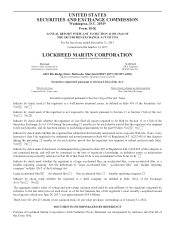Lockheed Martin 2013 Annual Report Download - page 19
Download and view the complete annual report
Please find page 19 of the 2013 Lockheed Martin annual report below. You can navigate through the pages in the report by either clicking on the pages listed below, or by using the keyword search tool below to find specific information within the annual report.could have an adverse impact on our results of operations. For more information regarding the F-35 program, see “Status of
the F-35 Program” in Management’s Discussion and Analysis of Financial Condition and Results of Operations.
Based upon our diverse range of defense, homeland security, and information technology products and services, we
believe that this makes it less likely that cuts in any specific contract or program will have a long-term effect on our business.
However, termination of multiple or large programs or contracts could adversely affect our business and future financial
performance. We could incur expenses beyond those that would be reimbursed if one or more of our existing contracts were
terminated for convenience due to lack of funding or other reasons. Potential changes in funding priorities may afford new or
additional opportunities for our businesses in terms of existing, follow-on, or replacement programs. While we would expect
to compete, and be well positioned as the incumbent on existing programs, we may not be successful, or the replacement
programs may be funded at lower levels.
On January 17, 2014, the U.S. Government passed its GFY 2014 budget to finance all activities through September 30,
2014, the end of its current fiscal year, after operating under continuing resolution temporary funding measures from
October 1, 2013 to January 18, 2014. The budget provides discretionary defense spending at levels consistent with the
planned defense spending limits in the Bipartisan Budget Act and eliminated much of the uncertainty and inefficiency in
procuring products and services under the continuing resolution. In years when the U.S. Government does not complete its
budget process before the end of its fiscal year, government operations typically are funded through a continuing resolution
that authorizes agencies of the U.S. Government to continue to operate, but does not authorize new spending initiatives.
When the U.S. Government operates under a continuing resolution, delays can occur in contract awards due to lack of
funding. Historically, this has not had a material effect on our business. Should a continuing resolution be used to fund U.S.
Government Operations after GFY 2014 or decisions regarding sequestration remain pending, it may cause additional
government contract awards to be delayed, canceled, or funded at lower levels and cause our results of operations to vary
between periods. In some circumstances, we may continue to work without funding, and use our funds, in order to meet our
customer’s desired delivery dates for products or services. Such funds could be at risk if the U.S. Government does not
provide authorization and additional funding to our programs.
We are subject to a number of procurement laws and regulations. Our business and our reputation could be adversely
affected if we fail to comply with these laws.
We must comply with and are affected by laws and regulations relating to the award, administration, and performance of
U.S. Government contracts. Government contract laws and regulations affect how we do business with our customers and
impose certain risks and costs on our business. A violation of specific laws and regulations could harm our reputation and
result in the imposition of fines and penalties, the termination of our contracts, suspension or debarment from bidding on or
being awarded contracts, loss of our ability to export products or services, and civil or criminal investigations or proceedings.
In some instances, these laws and regulations impose terms or rights that are different than those typically found in
commercial transactions. For example, the U.S. Government may terminate any of our government contracts and
subcontracts either at its convenience or for default based on our performance. Upon termination for convenience of a fixed-
price type contract, we normally are entitled to receive the purchase price for delivered items, reimbursement for allowable
costs for work-in-process, and an allowance for profit on the contract or adjustment for loss if completion of performance
would have resulted in a loss.
Upon termination for convenience of a cost-reimbursable contract, we normally are entitled to reimbursement of
allowable costs plus a portion of the fee. Allowable costs would include our cost to terminate agreements with our suppliers
and subcontractors. The amount of the fee recovered, if any, is related to the portion of the work accomplished prior to
termination and is determined by negotiation. We attempt to ensure that adequate funds are available by notifying the
customer when its estimated costs, including those associated with a possible termination for convenience, approach levels
specified as being allotted to its programs. As funds are typically appropriated on a fiscal-year basis and as the costs of a
termination for convenience may exceed the costs of continuing a program in a given fiscal year, occasionally programs do
not have sufficient funds appropriated to cover the termination costs were the government to terminate them for convenience.
Under such circumstances, the U.S. Government could assert that it is not required to appropriate additional funding.
A termination arising out of our default may expose us to liability and have a material adverse effect on our ability to
compete for future contracts and orders. In addition, on those contracts for which we are teamed with others and are not the
prime contractor, the U.S. Government could terminate a prime contract under which we are a subcontractor,
notwithstanding the quality of our services as a subcontractor. In the case of termination for default, the U.S. Government
could make claims to reduce the contract value or recover its procurement costs and could assess other special penalties.
However, under such circumstances we have rights and remedial actions under laws and the Federal Acquisition Regulations
(FAR).
11
























